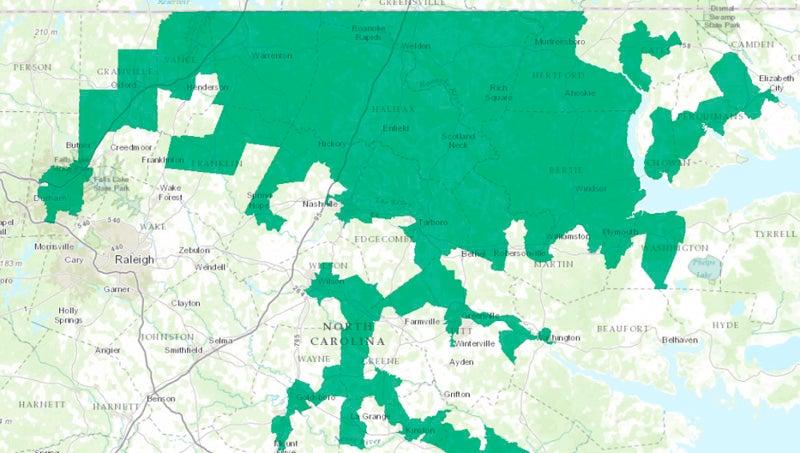An end to gerrymandering?
Published 8:29 pm Thursday, February 21, 2019

- INKBLOT TEST: Maps drawn by the state legislature in 2011 placed Washington and Durham in the same U.S. Congressional District. (U.S. Census Bureau)
Politically speaking, in North Carolina the 2010s will be remembered as an era of redistricting woes and court fights over gerrymandering. A bill filed this week in the N.C. House seeks to change North Carolina’s redistricting practices with a constitutional amendment, making the redistricting process nonpartisan.
Currently, U.S. and N.C. legislative maps are drawn by the state legislature every 10 years based on data that comes from the U.S. Census. Under the proposed law, the responsibility for creating these maps would fall to the nonpartisan Legislative Services Office, with all the data and methodology for making these maps available for public inspection.
Here are a few highlights, as written in a UNC School of Government bill summary, of district requirements proposed under House Bill 140, which has a combination of both Democratic and Republican sponsors:
- Prohibits using political affiliations of registered voters, previous election results, residential address of an incumbent or declared candidate, demographic information other than population head counts, except as required to comply with federal law, or any other data which could identify with reasonable certainty the voting tendencies of any group of citizens
- Each electoral district required by federal law or the State Constitution must be formed before the formation of all other electoral districts and must be formed consistent with law
- Each electoral district must be established on the basis of population
- Each electoral district is to consist of contiguous territory
- Prohibits, to the extent practicable, dividing a county in the drawing of any Congressional or legislative districts
- Requires each electoral district to be as reasonably compact as practicable
- Requires that for Congressional and legislative districts, a single member be apportioned to each electoral district
- Prohibits drawing electoral districts with the purpose of discriminating on the basis of race or political affiliation.
- Sets out the process for considering bills establishing electoral districts, including when information must be made available to the public.
If the General Assembly, the governor and ultimately the voters of North Carolina approve, these changes would be written in to the N.C. Constitution.
When Republicans swept both chambers of the General Assembly and the Governor’s mansion in 2010 — the first time the party had control of all three since Reconstruction — the argument could be heard, perhaps with some truth, that Democrats had been manipulating the maps for years to produce favorable electoral outcomes.
Two wrongs, however, do not make a right.
Partisan gerrymandering, while perhaps politically favorable in the short term for the party that holds the pen, ultimately denies voters a fair shot at choosing their representation.
It’s time for North Carolina to take a serious look at the redistricting process. With the 2020 census just around the corner, our legislators’ ability to figure out a fair solution to redistricting may save us all from another decade spent in court.





